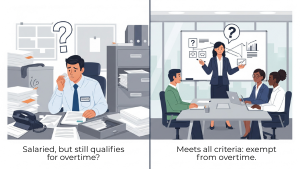You’d be surprised how many employers — and employees — get this wrong. Just because someone works full-time doesn’t mean they’re entitled to overtime. And just because someone gets a salary doesn’t mean they’re exempt from it.
Overtime eligibility comes down to legal classification. Get it wrong, and you’re either breaking the law or leaving money on the table.
Categories of Workers Who Are Not Entitled to Overtime
Here’s who is generally not eligible for overtime under both federal law (FLSA) and New York State law — assuming they meet all the required conditions:
1. Executive Employees
These folks typically:
- Manage at least two full-time employees
- Have the authority to hire or fire, or their input is seriously considered
- Earn at least $1,237.50/week in NYC or $1,161.65/week in the rest of NY (2024)
If they’re missing one of those points? They’re not exempt. And you’ll owe them overtime.
2. Administrative Employees
We’re talking about decision-makers, not just support staff. They must:
- Do office work directly related to management or business operations
- Exercise independent judgment on matters of significance
- Meet the same weekly salary thresholds listed above
If their role is more “task-doer” than “decision-maker,” they’re probably misclassified.
3. Learned Professionals
These are people in fields that require advanced knowledge — doctors, lawyers, CPAs, engineers. They need:
- A degree in a specialized field
- To apply that knowledge consistently in their job
- To meet the minimum salary test
Your marketing associate with a bachelor’s degree isn’t “exempt” just because they went to school.
Other Categories That Often Don’t Get Overtime
- Outside salespeople — who work away from the office and make actual sales (not just generate leads)
- Certain computer professionals — earning at least $684/week federally, or meeting NY’s thresholds, doing high-level work like systems analysis or programming
- Independent contractors — true 1099 workers (not just employees misclassified as such)
And then there’s the gray area — salaried workers who’ve been misclassified under one of the exemptions above. That’s where most wage and hour cases come from.
Common Misclassification Scenarios We See
- Calling someone a “manager” who has no staff and no say in hiring
- Treating admins as exempt because they handle scheduling or paperwork
- Failing to adjust for updated salary thresholds in 2024 and 2026
- Using job titles instead of job duties to justify exempt status
I’ve reviewed so many payroll setups where the intent was good, but the classification was wrong. That one error could lead to years of backpay — and lawsuits.
What I Tell Employers and Employees
If you’re not sure whether someone qualifies for an overtime exemption, don’t guess. Guessing gets people sued.
Our wage and hour law firm has handled both sides of these disputes. We know what the law says, how it’s enforced, and what it costs when it’s ignored.
If you’re questioning an exemption — or wondering if you’re owed overtime — contact us. Whether you need a second opinion or a full review, The Samuel Law Firm is here to help.


